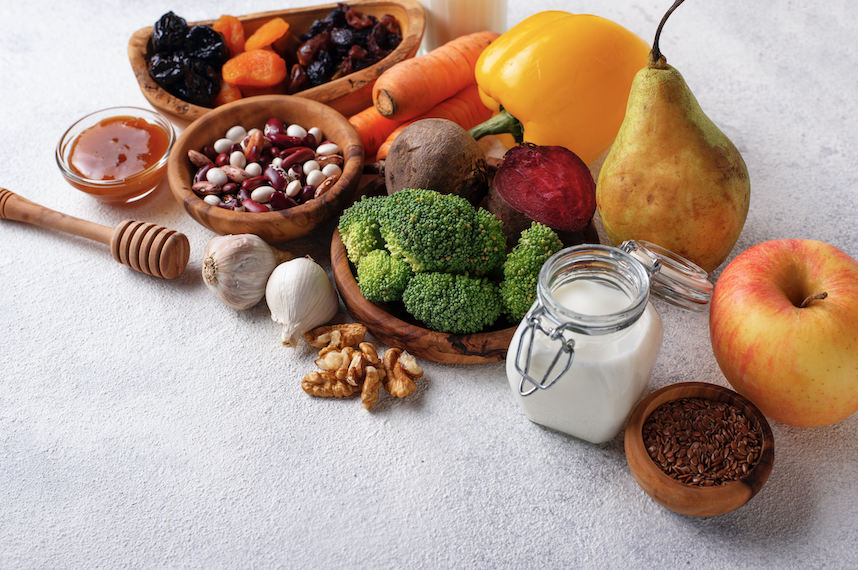
The tiny living creatures that reside in our gut can number in the trillions, are diverse in species, complex in their function, and can have a wide range of effects on human health. For this reason, many diners are seeking to nourish their Microbiome, the environment in the gut composed of all the living microorganisms that can positively impact our health, depending on what we feed them.
The gut microbiome consists of not only bacteria, but also yeasts, viruses, and parasites. Researchers in recent years have worked extensively to determine the function of these microorganisms, and the effect they may have on human health. Diet plays a role in this diversity, with most research focusing on macronutrients (carbohydrates, protein, and fat) and their effects on the gut microbiome. Because of this, people are increasingly seeking diets and menu items that will promote gut health.
The number and species of microorganisms in the gut varies significantly between individuals. Such variation could be caused by differences in diet, lifestyle (whether we exercise), and environment (stress, smoking, socioeconomic status, where you reside geographically, etc.). For example, the gut begins to be colonized by bacteria and other microorganisms from the moment we are born. Whether we are born by cesarean section, whether we are breastfed as infants, and the type of diet we eat as we grow can all influence the makeup of our gut microbiome significantly. Certain disease states, such as Inflammatory Bowel Disease, Type II Diabetes, cardiovascular diseases, obesity, and colorectal cancers, are associated with certain numbers and types of microorganisms that live in our guts. Research has also shown that changing our diet both in the short-term and long-term can result in significant changes in the gut microbiota. For this reason, many people want to do everything they can to promote the growth of so-called “good bacteria” that are associated with health. How does this work exactly and what foods will do this?
Certain compounds that we eat may escape digestion and absorption in our small intestine. These compounds that manage to make it through the small intestine intact are then encountered by bacteria and other microorganisms in the large intestine. They rely on these compounds for nourishment that our bodies do not have the enzymes to break down. You may also hear this process referred to as fermentation. While this is the process that results in the production of gas, it also can result in the production of many beneficial compounds as well as the release of nutrients, vitamins or minerals, such as Vitamin K, Vitamin B12, Biotin, Folate, Thiamine, and products known as short chain fatty acids that impact immune function and inflammation in the body.
Dietary fiber is a component of many plant foods similar to carbohydrates in chemical structure but is indigestible by the human body. Therefore, eating fiber every day, (between 25- 38 grams, depending on your age and gender) is recommended to reduce risk of certain diseases and maintain bowel health. There are specific types of fiber in foods that are known to promote the growth of healthy bacteria, and these foods are referred to as prebiotics. While some may refer to prebiotics by their scientific name (fructooligosaccharides and galactoligosaccharides, among others), it’s easiest to remember that these are fibers found in fruits, vegetables, and whole grains. Foods such as garlic, onions, leeks, bananas, asparagus, artichokes, and whole wheat are especially high in them.
Probiotics are an additional source of live bacteria, which some people may eat in attempt to populate their gut with good bacteria. These live cultures may be found in a variety of fermented foods, such as yogurts, kefir, cheeses, sauerkraut, kimchi, miso, and tempeh. Supplementation with probiotics may also help, but research is still being done to determine specific types and doses of probiotics that are most beneficial.
There are also components of our diets that may have potentially negative effects on our gut microbiome. The amount of protein and fat, specifically saturated fat, that we eat can promote the growth of microbes that produce toxins which are known to increase inflammation. Additionally, sugar alcohols (artificial sweeteners) may pass into the large intestine undigested and influence the make up of the gut microbiome negatively. For this reason, diners may be consuming less high fat red meats, high fat dairy, fried foods, and artificial sweeteners, and more unprocessed, plant-based foods.
We are now discovering that because the diversity of our microbiome can play such a large role in our health, it is in our best interests to eat to nourish our gut long term. Diners are increasingly seeking whole food, plant-based menu options for this and many other reasons besides the influence diet can have on the gut microbiome. If you work to meet these customer needs, you will likely create delight in your customers who will keep coming back.
Sources:



